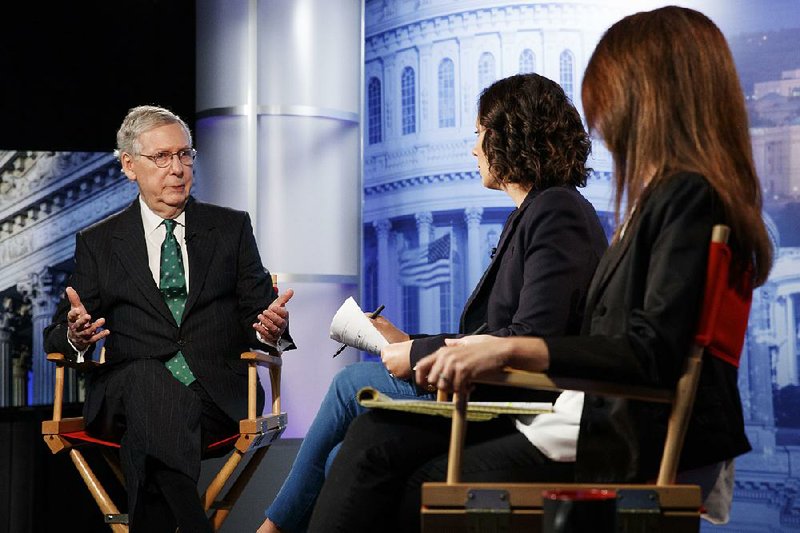WASHINGTON -- Senate Majority Leader Mitch McConnell acknowledged Wednesday that Republicans have a long-standing gender gap when it comes to American women, but he stood by one key Senate woman, saying "nobody's going to beat" Sen. Lisa Murkowski of Alaska despite her opposition to Brett Kavanaugh.
In an Associated Press interview, McConnell took issue with President Donald Trump, who has said Alaska voters "will never forgive" Murkowski and that she'll "never recover" politically after bucking her party on Kavanaugh last week.
The GOP leader said he doesn't think the acrimonious battle over confirming Kavanaugh to the Supreme Court over sexual-misconduct allegations made the gap in which Republicans trail Democrats in support among women any worse. But he didn't say that was such great news.
"I don't see how it could be much wider than it already was," he said. "We've always had that," though in general "it clearly is wider than it used to be."
On a positive note for his party, he said he expects the Kavanaugh confirmation fight and approval to provide an "adrenaline shot" of GOP enthusiasm at the polls. Heading into the November midterms, the party is defending its House and Senate majorities. Only six of the 51 Republicans in the Senate are women.
The GOP leader said it's not that there aren't enough Republican women running, but that they don't win their elections the way Democratic women do.
"It's a great frustration," he said.
The 76-year-old McConnell, who's been in the Senate since 1985 and majority leader since 2015, said one change he's hoping to see is on the Senate's Judiciary Committee.
The all-male lineup on the Republican side drew attention during the confirmation hearings for Kavanaugh, who was accused of sexual misconduct in high school and college. He has denied the allegations.
McConnell said he's hoping to persuade more Republican women to join the committee but hasn't had much success in the past because "they just haven't been interested."
As for the accusations against Kavanaugh, he said he found Christine Blasey Ford's account of her sexual assault "convincing" but noted that there had been no corroboration.
Murkowski was the only Republican who voted against advancing Kavanaugh's nomination to a full roll call, and she voted "present" on the final tally. Trump has said Alaskans will make her pay.
However, "Nobody's going to beat her," McConnell said. He noted that Murkowski won election on write-in votes in 2010 and said, "She's about as strong as you can possibly be in Alaska."
The GOP leader also split from Trump to defend Democratic Sen. Dianne Feinstein, whom the president accused of leaking a private letter from Ford.
"I haven't criticized Dianne," McConnell said.
Facing the prospect of a tough midterm election that could alter control of the House, McConnell warned that Democrats will pay a political price if they win and then use their majority to dig into investigating Trump next year. He says it would backfire and help Trump in 2020 the way President Bill Clinton's impeachment cost Republicans two decades ago.
"I think it'll help the president get re-elected," he said. "This business of presidential harassment may or may not be quite the winner they think it is."
If control of Congress does split, he envisions a Republican Senate majority keeping full-throttle on confirming the president's nominees -- including another Supreme Court pick if there's a vacancy. He bemoaned what he considered Democrats tying the Senate in knots with procedural votes on less controversial executive branch nominations.
"Far be it from me to complain about obstruction, I've done my share of it. But never just kind of mindless obstruction," he said.
One key nomination could be for a new attorney general if the president fires Jeff Sessions, as has been hinted, after the midterm elections.
McConnell declined to weigh in on a possible replacement except to say he or she would not be coming from the ranks of his slim 51-seat Senate majority. Republicans Lindsey Graham of South Carolina and John Cornyn of Texas have been among those mentioned.
"It's not going to be from our caucus, I can tell you that," he said.
The GOP leader said he's expecting a "relatively lively" lame-duck session after the election and did not shy away from a possible federal government shutdown over funding for Trump's border wall. He suggested it would be modest since Congress has already provided yearlong funding for some 75 percent of federal operations.
"That episode, if it occurs, would be in the portion of the government we haven't funded," he said. "We're committed to helping the president try to get the wall funding."
McConnell is also preparing for his own re-election in 2020 and, if he is successful, staying on as GOP leader.
Information for this article was contributed by Matthew Daly, Mary Clare Jalonick and Padmananda Rama of The Associated Press.
A Section on 10/11/2018
